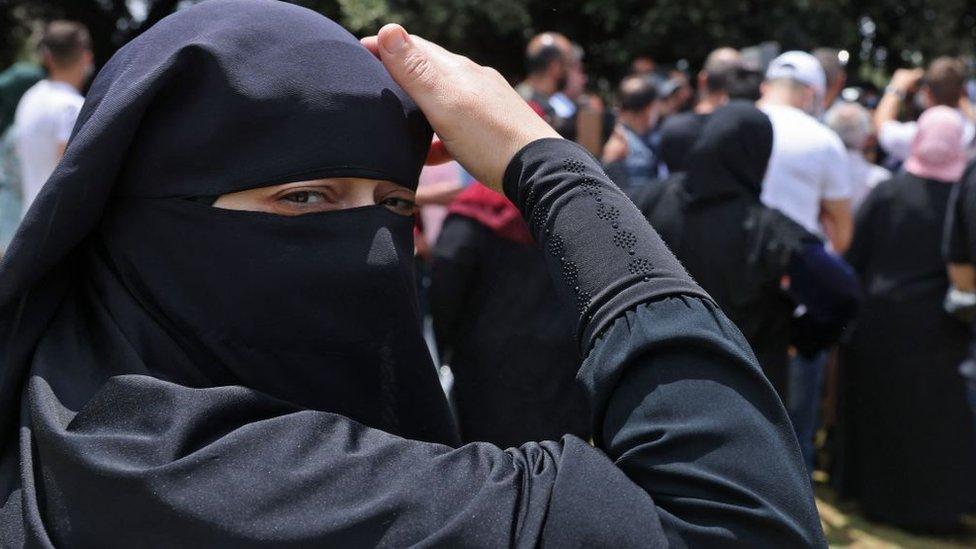Israel's new government fails to extend controversial citizenship law
- Published

The vote was the first major political test for Israeli Prime Minister Naftali Bennett's coalition
Israel's parliament has failed to pass an extension to a controversial law barring Palestinians from the occupied West Bank or Gaza who marry Israelis from being granted citizenship rights.
After a debate that lasted through the night, the vote was tied 59 to 59.
It was the first big defeat for Prime Minister Naftali Bennett's government since it took office last month.
The legislation, which critics say is discriminatory, will expire at the end of Tuesday unless there is a new vote.
Thousands of Palestinians previously unable to claim citizenship rights may now be able to do so, although the interior minister will still have the power to reject applications on a case-by-case basis.
Mr Bennett set up the vote on the citizenship law as a vote of confidence in his new ideologically diverse government, which comprises eight left-wing, centrist, right-wing and Arab parties and has a razor-thin majority of one seat in the 120-seat parliament.
He had hoped a compromise tabled on Monday would be accepted. It would have extended the law by six months, rather than a year, and seen about 1,600 Palestinians living in Israel granted residency rights.
But in a tense, late-night session, Mr Bennett's government came up short, with one member of his right-wing nationalist Yamina party among those who voted against an extension. There were also two abstentions from the United Arab List, a party representing Israel's Arab minority that sits in the coalition.
Right-wing opposition politicians who had previously supported the legislation, led by recently ousted long-time Prime Minister Benjamin Netanyahu, voted against the law to embarrass Mr Bennett.
Writing on Twitter afterwards, Interior Minister Ayelet Shaked of Yamina condemned as "madness" the celebrations by members of Mr Netanyahu's Likud party and the far-right Religious Zionism alliance, saying their actions would "lead to 15,000 citizenship applications".

Israeli Arabs protested against the citizenship law outside the parliament building on Monday
Mr Bennett later accused the opposition of choosing "petty politics over the benefit of Israeli citizens".
"The opposition deliberately took a direct strike at the state's security, out of some sort of bitterness and frustration," he said. "They ultimately harmed the good of the country."
He promised to "fix the matter and present the public with good solutions".
Likud responded by accusing the prime minister of "insolence".
"He's talking about damaging national security? Someone who formed a weak coalition that relies on the votes of the extreme left and post-Zionist parties should not pretend to care about Israel's security," the party said in a statement, according to the Times of Israel.
The Citizenship and Entry Law was originally passed in 2003, at the time of the second Palestinian intifada, or uprising, when Palestinian militants were carrying out attacks inside Israel.
The authorities have renewed it every year since, citing security reasons.
However, critics believe it is motivated by the desire to maintain a Jewish majority in Israel.
An Israeli Arab who attended a protest outside parliament on Monday said his family had been confined to a "continuous prison" as a result of the law.
"I am asking for rights that the state owes us... for my wife to have Israeli ID, residency rights and freedom of movement," Ali Meteb told AFP news agency.
Asmahan Jabali, a woman who has been married to an Israeli for 26 years but does not have Israeli citizenship, told Reuters after Tuesday's vote: "This is a temporary victory, but it is only the beginning."

You may also be interested in
Israel's new Prime Minister, Naftali Bennett, addresses the Knesset at his first cabinet meeting
- Published12 January 2012
- Published13 June 2021

- Published18 June 2021
